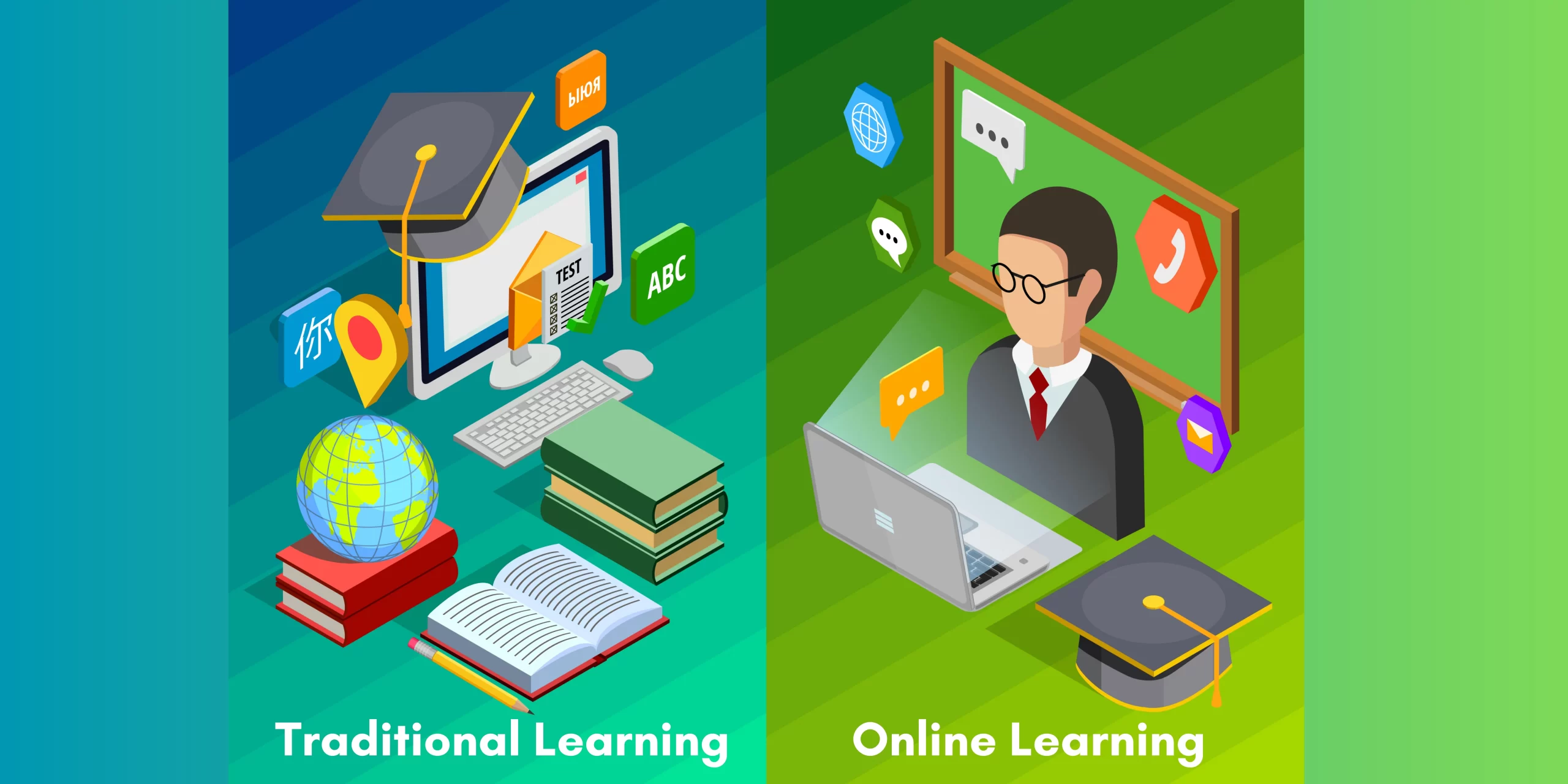Education today offers two primary paths: online learning and traditional classroom-based education. Each comes with unique strengths, challenges, and a growing impact on students and professionals worldwide.
Online learning has gained significant traction, driven by its accessibility and flexibility. Traditional learning, on the other hand, remains the preferred choice for those who value face-to-face interaction and structured environments.
Understanding these two modes of education helps you make informed decisions that suit your lifestyle, goals, and learning style. For busy students, services like “take my online class for me” make online education manageable while maintaining academic performance.
This article explores the differences between online and traditional learning, their benefits, and their role in shaping modern education. Whether you’re considering hiring someone to take your online class or debating a return to a traditional classroom, this guide breaks it down for you.
What is Online Learning?
Online learning involves accessing educational content through digital platforms. It offers flexibility, enabling you to study from home, work, or even while traveling.
Key elements of online learning include:
- Video lectures (live or pre-recorded).
- Interactive discussion boards.
- Self-paced modules with flexible deadlines.
This method appeals to those managing multiple responsibilities. For instance, professionals and parents often turn to online class help services to meet deadlines without sacrificing other commitments.
Online learning is not limited by geography. You can enroll in global programs without the need to relocate. Many institutions offer certifications, diplomas, or degrees that are entirely online, providing broader options for learners.
With advancements in technology, this mode of education is now more immersive, offering tools like virtual labs and AI-driven learning platforms. For added convenience, you can also hire online class takers to assist with assignments and exams.
What is Traditional Learning?
Traditional learning refers to education in a physical classroom setting. It involves direct interaction with teachers and peers, creating a structured and immersive learning environment.
Key features of traditional learning include:
- Scheduled lectures and activities.
- Access to campus facilities like libraries, labs, and sports centers.
- Real-time feedback from instructors during face-to-face interactions.
This method works well for students who prefer a set routine and thrive on in-person discussions and group work. It fosters a sense of community and helps you build interpersonal skills critical for future professional relationships.
Traditional learning also provides hands-on experiences that are difficult to replicate in an online environment. For example, science students can perform experiments in well-equipped labs, while business students can collaborate on real-world projects.
Despite its strengths, traditional learning can be restrictive for those with tight schedules or geographical limitations, making it less suitable for some.
Key Differences Between Online and Traditional Learning
Learning differs significantly in structure, delivery, and accessibility. Understanding these differences can help you choose the best option for your educational needs.
Flexibility
- Online learning offers self-paced schedules, allowing you to study at your convenience.
- Traditional learning has fixed schedules and requires attendance at specific times.
Accessibility
- With online learning, you can access classes and materials from anywhere with an internet connection.
- Traditional learning requires physical presence in classrooms, which may be challenging for remote learners.
Cost
- Online education is often more affordable, with fewer associated costs like commuting or housing.
- Traditional learning involves expenses for travel, accommodation, and campus facilities.
Interaction
- Online learning relies on virtual communication through forums, video calls, or emails.
- Traditional learning allows for face-to-face interaction with instructors and peers, fostering personal connections.
Support Services
- Many students in online education use services like online class help to manage workloads.
- Traditional learning provides direct access to tutors and mentors for real-time support.
Choosing between these modes depends on your lifestyle, goals, and learning preferences.
Advantages of Online Learning
Online learning has become a popular choice for students due to its numerous benefits.
Flexibility
- Study anytime, anywhere. This is ideal for those balancing education with jobs or family.
- Self-paced courses let you complete assignments at your speed.
Affordability
- Online courses often cost less than traditional programs.
- You save on commuting, housing, and other expenses.
Accessibility
- Learn from institutions worldwide without relocating.
- Access diverse course options that may not be available locally.
Personalized Support
- Services like “take my online class” help students stay on track by managing assignments and exams.
- Platforms offering help with online classes cater to busy learners who need academic assistance.
Tech-Driven Learning
- Virtual labs and interactive tools make online education engaging.
- Recorded sessions let you revisit lessons anytime.
These benefits make online learning an attractive option for modern learners.
Advantages of Traditional Learning
Traditional learning offers a structured environment and valuable face-to-face experiences.
Direct Interaction
- Build strong relationships with instructors and classmates.
- Engage in real-time discussions, debates, and feedback.
Hands-On Experiences
- Use resources like science labs, libraries, and workshops.
- Gain practical skills through group projects and in-person activities.
Structured Environment
- Fixed schedules help maintain discipline and consistency.
- Classroom settings encourage accountability.
Networking Opportunities
- Connect with peers and professionals in your field.
- Develop interpersonal skills critical for career success.
While traditional learning may not suit everyone, its structured approach benefits those who thrive in a disciplined setting.
Importance of Choosing the Right Mode of Learning
Choosing between online learning and traditional learning depends on your unique needs, goals, and circumstances. Each mode offers distinct advantages, and the right choice can greatly impact your educational success.
Consider Your Learning Style
- If you value flexibility and independence, online learning may suit you.
- For those who thrive on structure and face-to-face interactions, traditional learning might be better.
Evaluate Your Schedule
- If you juggle work, family, or other responsibilities, online classes provide the convenience to balance your commitments.
- Students with fewer time constraints may benefit from the structured approach of traditional learning.
Assess Financial Considerations
- Online education is often more affordable, making it a practical option for budget-conscious students.
- Traditional learning may involve higher costs due to commuting, accommodation, and campus fees.
Personal Goals and Career Aspirations
- Some careers or programs may require hands-on training best achieved in a classroom setting.
- Others can be effectively pursued through online platforms and resources.
By understanding your priorities, you can make an informed decision that aligns with your lifestyle and academic goals.
Challenges of Both Learning Modes
While both online learning and traditional learning have benefits, they also come with challenges.
Challenges of Online Learning
- Lack of in-person interaction can feel isolating.
- Staying motivated requires strong self-discipline.
- Technical issues like unreliable internet can disrupt learning.
- Balancing multiple responsibilities might lead students to seek online class help services for assistance.
Challenges of Traditional Learning
- Fixed schedules may not accommodate personal or professional commitments.
- Higher costs, including transportation and housing, can be a barrier.
- Limited flexibility may not suit students with irregular schedules.
- Access to resources is restricted to specific times and locations.
Understanding these challenges allows you to prepare and seek support, whether from online class helpers or other resources, to succeed in your chosen path.
How Online Class Help Services Bridge the Gap?
Many students find balancing online learning with life’s demands challenging. This is where online class help services play a crucial role.
What Do These Services Offer?
- They help manage assignments, exams, and deadlines.
- Services like “pay someone to take my online class” provide support for students overwhelmed by their schedules.
- Experienced online class takers ensure coursework is completed on time.
Why Are These Services Valuable?
- They allow students to focus on personal or professional commitments without compromising education.
- Students who struggle with specific subjects can get targeted help to improve their performance.
- Services cater to a wide range of courses and programs, from beginner to advanced levels.
These solutions make online education accessible for students who need extra support. Whether you’re balancing a full-time job, caring for family, or simply need help staying organized, online class help services can ease the load.
Future of Education: A Blend of Both?
The future of education is shifting toward a hybrid model, combining the best aspects of online learning and traditional learning. This blended approach offers flexibility, accessibility, and interactive experiences, meeting the diverse needs of modern students.
Benefits of Hybrid Learning
- Flexibility: Students can attend some classes online while participating in on-campus activities when needed.
- Enhanced Accessibility: Those in remote areas can access high-quality education while benefiting from occasional face-to-face interactions.
- Diverse Learning Resources: A mix of digital tools and in-person sessions provides a comprehensive educational experience.
Real-World Examples
- Universities are now offering programs that allow students to choose between online and on-campus classes.
- Employers increasingly value hybrid learning experiences as they prepare students for flexible work environments.
Hybrid learning is likely to dominate education, offering students and institutions a way to adapt to changing demands.
Conclusion
Education today is more accessible and diverse than ever, with online learning and traditional learning serving distinct needs. While online education provides flexibility and cost-effectiveness, traditional classrooms offer structure and personal connections.
Choosing the right mode depends on your learning preferences, schedule, and career goals. Many students find support in online class help services, ensuring they excel in academics while managing other responsibilities.
Whether you prefer the convenience of online platforms or the discipline of classroom settings, both modes of education have their place in shaping your future. Exploring a hybrid approach could also offer the best of both worlds.










